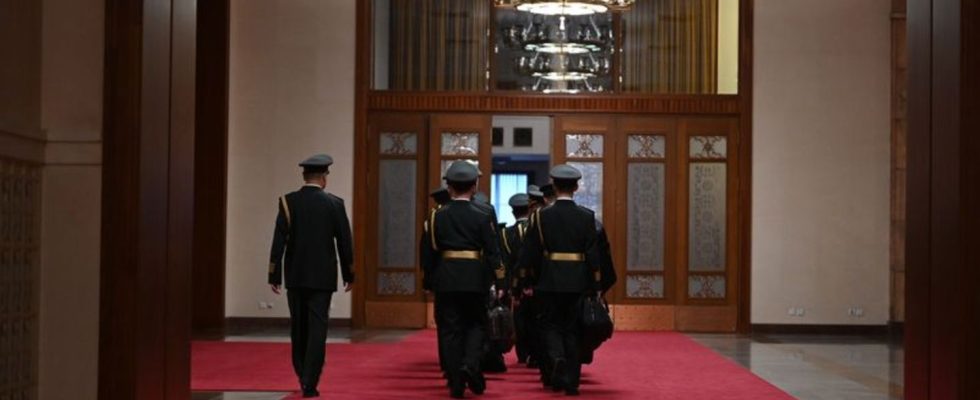Beijing People’s Congress
“It won’t be easy”: China wants five percent growth
The Military Police Chapel walks down a hallway in the Great Hall of the People. China plans to spend 7.2 percent more on its military this year than last year. photo
© Johannes Neudecker/dpa
China’s government presented an ambitious growth target at the start of the People’s Congress. At the same time, military spending is rising sharply again. Where is the second largest economy heading?
Li made it clear that the transformation of the economy must continue. “We should adhere to the principles of pursuing progress while ensuring stability, promoting stability through progress, and creating new things before abolishing old ones,” Li said. The transformation of the growth model must be pushed forward.
Last year, China had already aimed for growth of “around five percent”, which was ultimately slightly exceeded. According to official data from the Beijing Statistics Office, the second largest economy grew by 5.2 percent. However, critics fundamentally question the accuracy of Chinese economic data. Nevertheless, the level of the growth target is considered an important yardstick and indicator of the government’s economic policy course.
Recently, the Chinese economy suffered primarily from weak global demand, the ailing real estate market and weak domestic consumption. The Chinese stock market is under great pressure. Because of the economic crisis in the world’s second largest economy, domestic and foreign companies in particular are likely to be hoping for important signals from the People’s Congress this year.
Before the announcement, observers had described a possible growth target of around five percent as quite ambitious. Growth of this magnitude was easier to achieve last year because the economy benefited from catch-up effects after the corona pandemic.
As can be seen from the government’s additionally published budget draft, the deficit should be 3 percent of economic output. 3 percent was also planned for 2022, but this was later increased to 3.8 percent. Li also announced that more than twelve million new jobs will be created in cities this year. In addition, as in the previous year, the government is aiming for an unemployment rate of around 5.5 percent. Inflation is expected to be around three percent.
Beijing wants to invest heavily in the military again. According to the draft budget, the defense budget was increased by 7.2 percent to 1.67 trillion yuan (around 214 billion euros). The decision to significantly increase the budget again is probably related to the tense relationship with Taiwan, which China sees as a breakaway province, and disputed territorial claims in the South China Sea. Experts do not yet expect a war to break out in the strait between China and Taiwan. However, Beijing is striving for reunification with the island republic – if necessary with military means.
The People’s Republic maintains the largest army in the world in terms of an estimated two million active soldiers. China’s defense budget has grown faster than total spending in recent years. The increase was also mostly above the economic growth rate. However, according to experts, the official military budget only reflects a portion of the true expenditure, as many expenses for the People’s Liberation Army are also covered by other budgets.
The National People’s Congress is China’s non-freely elected parliament under the sole rule of the Communist Party. At its annual meeting, MPs approve the plans and goals of the government of state and party leader Xi Jinping and Prime Minister Li.

